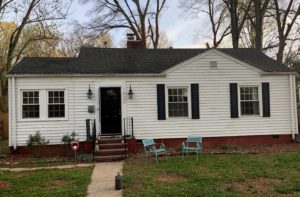
Leigh Avenue was a working class neighborhood on the edge of the mill section in North Charlotte and a lot of men who lived on that street had fought in World War II. Dad bought a two-bedroom house there in 1953, when I was 11, after he went broke mining coal in Alabama.
A glider pilot whose family lived across the street, a couple of doors down, didn’t come home. He was killed in France on D-Day.
One of our neighbors, Ernest Cook, a printer at the afternoon newspaper, had been a machine gunner in the Army. He had been wounded by German solders, and captured, after he had stayed behind to cover a retreat.
Sometimes, in the evenings, some of those men would sit around on lawn chairs, drinking beer, and talking about the war. I would lay on the grass nearby, in the dark, and listen. One evening I heard this story, told by a former Marine who had fought in the Pacific.
He said he had always wanted to cut an enemy solder’s throat but he said Japanese solders would not give up. He said they almost always fought to the death, or killed themselves, to avoid capture.
One night, after his unit had beaten back a frontal assault, he said he heard a Japanese soldier moaning in the high grass in front of his foxhole.
This is my chance, he thought.
It was dangerous to crawl out into the grass. Wounded men could still fight, maybe pull the pin on a grenade and kill them both. Japanese solders did that sometimes. But this might be the only chance he would ever get.
The Marine said he found the wounded soldier and was glad to see he wasn’t seriously hurt. He has been shot through a thigh — a flesh wound! It was almost as if he wasn’t hurt at all.
“I pulled my knife, grabbed him by the hair, and started to cut his throat,” the Marine said. “But he was so afraid –he looked so pitiful — I just couldn’t do it. So I shot him.”
Coming Friday: Stay Out Of My Way